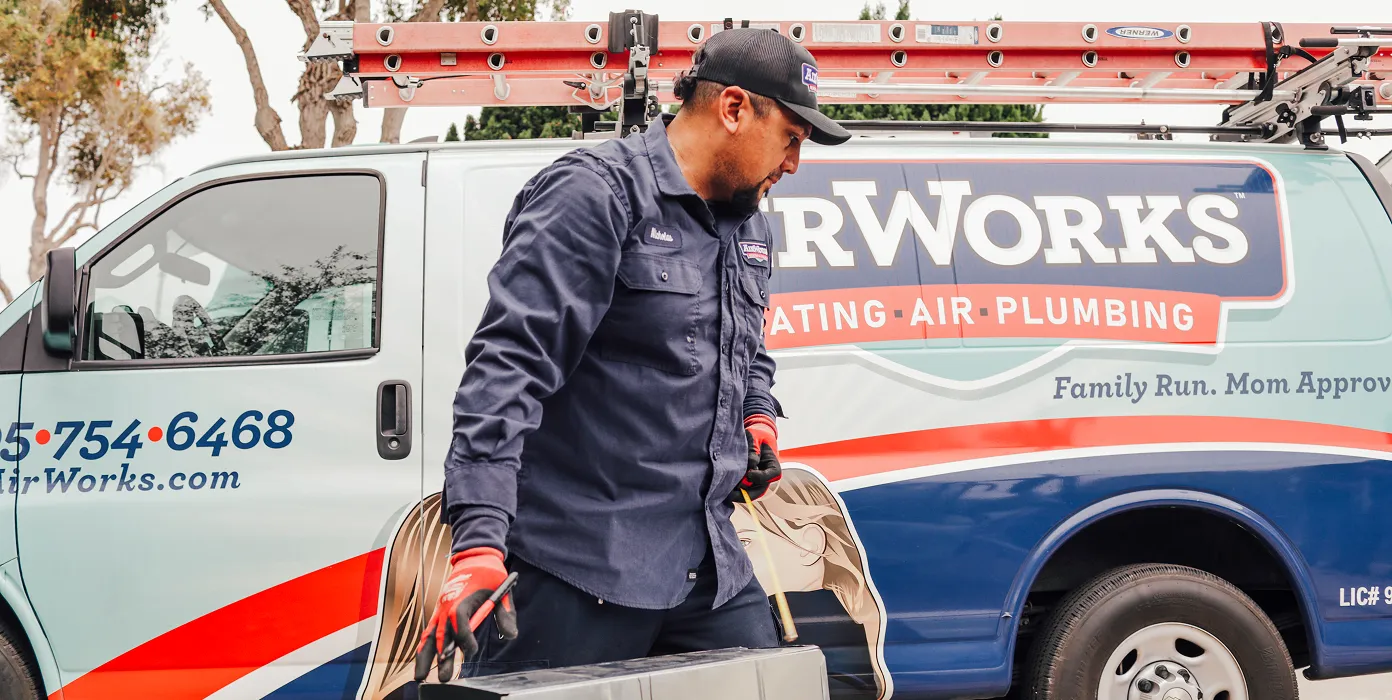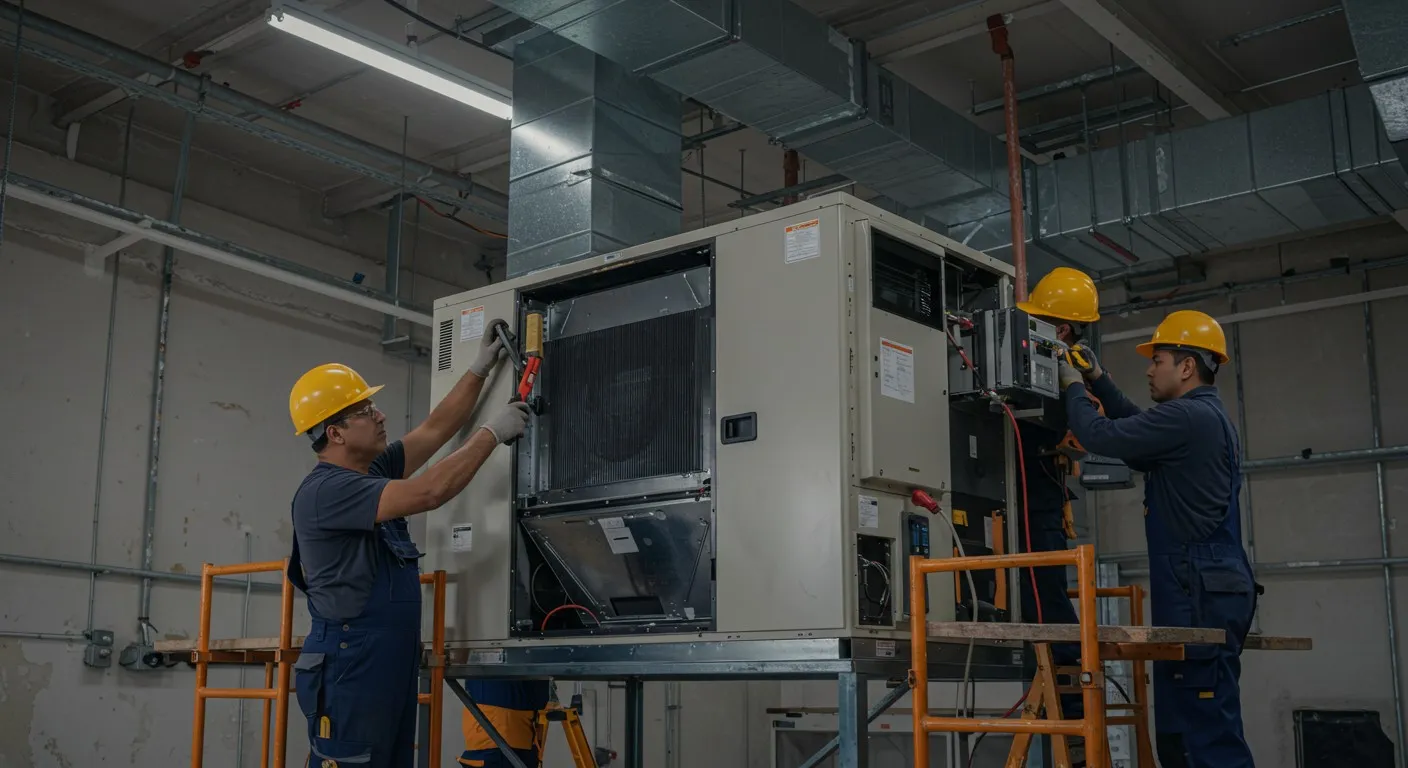Commercial Heater Installation in Chatsworth, CA
Serving Ventura & Sacramento Counties

Commercial Heater Installation in Chatsworth, CA
Commercial heater and boiler installation in Chatsworth, CA requires more than swapping equipment. Businesses here rely on dependable, code-compliant heating that handles varied commercial loads, minimizes downtime, and meets California energy and emissions rules. Whether you manage an office building, warehouse, restaurant, retail space, or light industrial facility, installing the right commercial heating system reduces operating costs, improves safety, and keeps occupants comfortable year round.
Why proper commercial heater installation matters in Chatsworth
Chatsworth sits in the western San Fernando Valley where winters are mild but mornings and evenings can be cool. Many commercial spaces use heating seasonally or for occupant comfort and process needs. Improperly sized or poorly installed systems lead to:
- Uneven heating that affects employee comfort and productivity
- High energy bills from oversized or inefficient equipment
- Frequent breakdowns and unscheduled service that disrupt operations
- Safety risks from combustion appliances, venting failures, or incorrect gas and electrical hookups
A professional installation addresses these risks up front so your business operates reliably and efficiently.

Common commercial heating needs and issues in Chatsworth
Commercial projects vary, but typical types and pain points include:
- Commercial boilers for hydronic heating in multi-tenant buildings and manufacturing spaces
- Large-capacity furnaces for warehouses and distribution centers
- Unit heaters and rooftop heating units for open-floor facilities
- Combination systems that integrate heating with existing HVAC or process systems
Common installation issues seen locally:
- Undersized venting and flue arrangements that cause draft or backflow
- Inadequate gas piping or electrical service capacity for new equipment
- Failure to meet Title 24 energy requirements and local mechanical code
- Poor planning that forces shutdowns during peak business hours
System selection for commercial loads
Selecting the right heater starts with accurate load calculation and a business-first approach:
- Load analysis
- Conduct a commercial heat loss calculation that accounts for building envelope, occupancy, equipment, process heat, and operating hours.
- Match equipment to load and duty cycle
- Choose boilers or heaters with staged or modulating controls for variable loads.
- Consider condensing vs non-condensing boilers based on return water temperatures and efficiency goals.
- Fuel choice and long-term costs
- Evaluate natural gas, electric, or propane options based on availability, reliability, and operating cost projections.
- Scalability and redundancy
- For critical operations, select modular systems or parallel boilers so maintenance can occur without full shutdown.
Fuel and venting considerations
Fuel type and venting are central to safe, code-compliant installations:
- Natural gas remains the most common fuel for commercial heaters in Chatsworth. Confirm local gas capacity and meter sizing early in planning.
- Venting must meet the California Mechanical Code and manufacturer specifications. Proper flue sizing, materials, and termination clearances avoid carbon monoxide and draft problems.
- For condensing boilers, include a neutralization plan for acidic condensate and compatible PVC or stainless venting where allowed.
- In tighter urban areas or rooftop installations, consider wind effects, rooftop curbs, and clearances to prevent backdrafting.
Safety, code compliance, and permitting
Commercial installations in Chatsworth must comply with state and local regulations:
- Title 24 energy compliance and CALGreen requirements often apply to commercial projects. Equipment selection and controls should be documented.
- California Mechanical Code and local building department rules cover combustion air, venting, and clearance requirements.
- Emissions and air quality rules may affect boiler choices. In regions near South Coast Air Quality Management District boundaries, low NOx appliances or additional permitting can be required.
- Permits, inspections, and startup documentation protect your business and ensure insurance and warranty coverage remain valid.
Electrical and gas connections
Proper utility connections are critical and must be coordinated:
- Gas piping must be sized, pressure-tested, and installed by licensed technicians familiar with commercial regulations.
- Electrical service for controls, fans, pumps, and ignition systems often requires a dedicated circuit and coordination with the building electrical contractor.
- Control integration with building automation systems or thermostatic staging improves efficiency but requires precise wiring and communication protocol setup.
- Surge protection and proper grounding for electronic control systems extend equipment life and reduce nuisance trips.
Scheduling installations to avoid business disruption
Minimizing downtime is a top priority for commercial customers:
- Phased installation plans let one section remain operational while another is upgraded.
- Off-hours or weekend work reduces impact on customers and employees for retail and office environments.
- Pre-fabrication of piping, curbs, duct transitions, and controls off-site compresses on-site time.
- Clear staging and contingency planning for unexpected findings during demolition avoids unnecessary shutdowns.
Commissioning and performance verification
A successful installation includes thorough commissioning:
- Functional testing of all safety interlocks, combustion systems, controls, pumps, and valves.
- Balancing and temperature verification to ensure even distribution of heat.
- Documentation of as-installed configurations, control settings, and maintenance recommendations.
- Training for facility staff on operation, basic troubleshooting, and emergency shutdown procedures.
Long-term benefits and maintenance guidance
A well-planned installation pays ongoing dividends:
- Improved energy efficiency lowers utility costs and supports sustainability goals.
- Reduced emergency repairs and longer equipment life with scheduled preventive maintenance.
- Enhanced occupant comfort and predictable operating budgets.
Maintenance best practices for Chatsworth facilities:
- Annual combustion analysis and tune-up for combustion appliances.
- Quarterly checks of pumps, controls, and safety devices in high-use systems.
- Keep venting and intake areas clear of debris and rooftop obstructions.
- Maintain records of service and commissioning documents for code compliance and warranty claims.
Choosing a commercial heater or boiler installation approach that centers on accurate load assessment, proper venting and fuel planning, code compliance, and careful scheduling protects your business operations and investment. In Chatsworth, attention to local climate patterns, Title 24 requirements, and emissions considerations ensures a reliable, efficient heating solution tailored to your commercial needs.
Code-Compliant Commercial Heating That Powers Business Comfort Efficiently
Ensure safe, efficient, and fully compliant commercial heater installation in Chatsworth, CA with the expertise of AirWorks Solutions. Their team delivers heating solutions tailored to commercial demands — whether you manage a warehouse, multi-tenant space, or light industrial facility. From proper fuel planning and load analysis to seismic venting and Title 24 compliance, your installation is engineered for longevity, low energy costs, and seamless operation — all with minimal disruption to your business.
Book Precision Commercial Heater Installation Built for Chatsworth Compliance and Comfort


